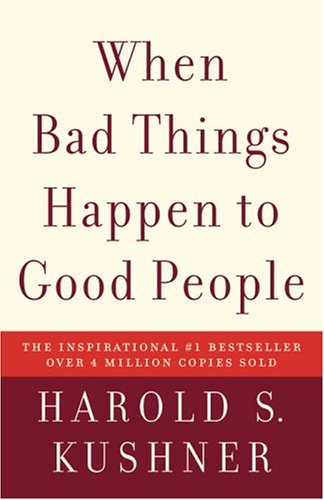I got about halfway through When Bad Things Happen to Good People by Rabbi Harold Kushner. It’s a good book. I didn’t finish the book primarily because his thesis is not acceptable to me and therefore not helpful in understanding suffering from an Abrahamic perspective. Rabbi Kushner argues that, given the existence of suffering in the world, the best answer is to give up God’s omnipotence. That’s impossible, because if God isn’t omnipotent, then He isn’t what we call God. He’s some lesser deity in competition with various other forces in the world, essentially giving us dualism or polytheism.

However, what caught my attention is that Rabbi Kushner is willing to give up God’s omnipotence because it puts God clearly on our side. He wants to help us. He just doesn’t always have the power. And this notion really clarified for me the importance of Jesus in making monotheism intelligible in a world of suffering. Jesus is God With Us, Immanuel. He is the one who emptied himself, taking the form of servant, being born in the likeness of men. He is the one pierced for our sins, crushed for our iniquity. He is the one who was put to death for our trespasses. Who is more illustrative of God being on our side, with us in our suffering, than Jesus?

Granted, Jesus’ suffering does not answer the logical problem of evil, but I have thought for many years now that the problem of evil isn’t first and foremost a logical problem. It is a values problem. We don’t just feel the world doesn’t make sense when we suffer. We feel it is unjust. God on his high mountain does nothing while we suffer and die. No amount of good can make this bad right. And if this sense of injustice is our problem, the figure of Jesus is incalculably valuable. If our Lord was humbled, pierced, crushed, scourged, and killed, then why is it unfair that the same should happen to us? We have a Lord who can relate to our sufferings in every way.
“For Christ also died for sins once for all, the righteous for the unrighteous, that he might bring us to God, being put to death in the flesh but made alive in the spirit.”

Instead of giving up God’s omnipotence, why flip the switch on his goodness? An all-knowing, all-powerful, all-evil God who lets good things happen to bad people to achieve his malevolent plans? That would seem pretty consistent with things n stuff?
I think an all-evil God has even more problems than an all-good God. We can make some sense of the evil in the world through human free will, God bringing good out of evil, the Fall of Adam and Eve, the sufferings of Jesus, etc. but I’m not sure how we’d make sense of the good in the world if an all-evil God created the world.
So, there has been such a large tapestry of theodicies offered in response to the Problem of Evil that I’m sure you don’t have to search very hard to find some that will successfully address the evil God hypothesis and its resultant Problem of Good with reasonable symmetry.
For example, free will:
Omnimalevolent God grants human beings free will so that they can freely choose to come to know Her and to become more like Her. She accepts that many will deploy their agency to inflict kindness and compassion on those around them and, in so doing, achieve happiness themselves. That’s quite OK in Evil God’s book, because She knows that people can successfully find acceptance and Meaning in their joy and thereby be in a better position to appreciate the exquisite extent of Her evil nature when they die and show up at the pearly gates (the Black Gate of Mordor would be a good substitute in this case).
Interestingly enough, this setup also wouldn’t preclude the existence of a nice post-mortal realm – the final destination of the souls of those who reject God, where, banished from Her presence, they have to endure eternal bliss.